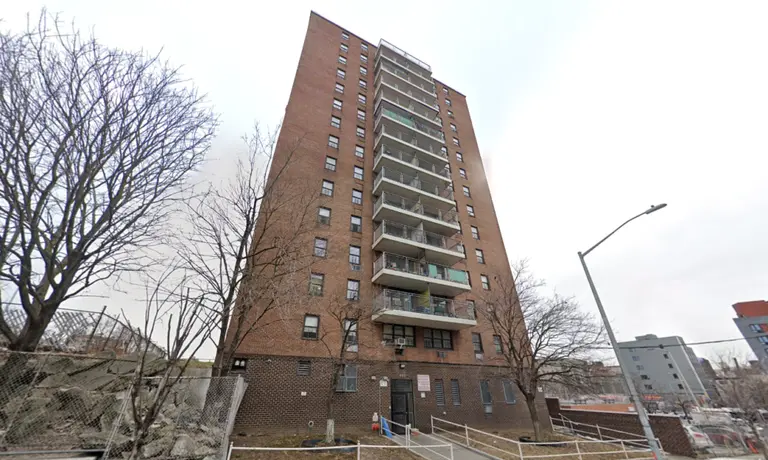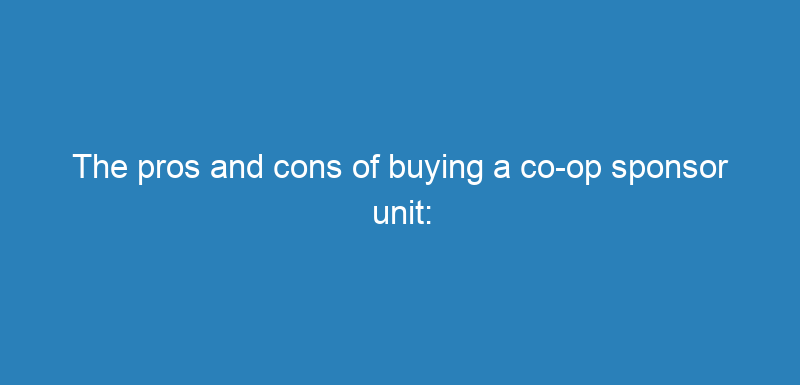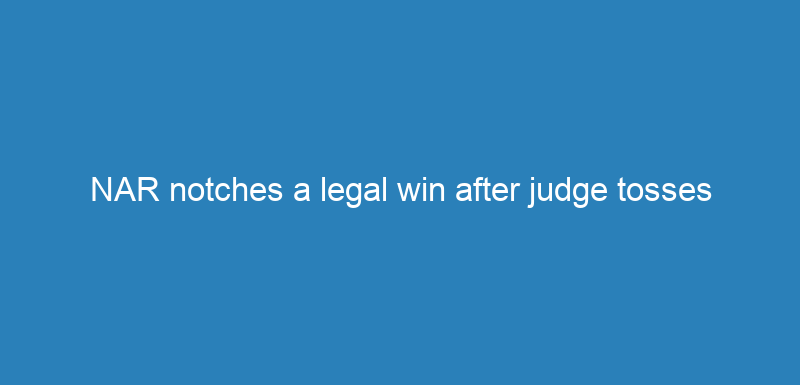Advanced Search
Latest Listings
Your search results


Category Archives: Real Estate
Gowanus luxury rental 544 Carroll launches leasing, in...

The future of Gowanus is looking expensive. Developed and designed by Avery Hall, 544 Carroll Street launched leasing this week for 133 apartments, including a duplex that could go for as much as $25,000/month. As first reported by the New York Post, the four-bedroom measures nearly 2,400 square feet plus outdoor space and surpasses the […]
The post Gowanus luxury rental 544 Carroll launches leasing, including $25K/month duplex first appeared on 6sqft.
The pros and cons of buying a co-op sponsor unit: You ...
If you’re looking to buy a co-op in New York City, the term “sponsor unit” may have caught your eye while scanning the city’s listings.
A sponsor co-op is an apartment being sold by the building’s owner or the corporation that established the co-op. There are several advantages to buying this type of apartment, the biggest one is that you get to skip the board approval process—a huge relief for many buyers.
Most co-op buildings were converted from rental buildings in the 1970s and 1980s. Existing tenants had the option to buy their apartments or keep renting. If a tenant didn’t buy, the sponsor retained ownership of the apartment and continued renting it to the tenant. When the tenant moves out and the building owner sells the unit, the apartment is listed as a sponsor unit.
[Editor’s note: An earlier version of this article was published in June 2024 and has been updated with new information for July 2025.]
Keep in mind that sponsor apartments can be more expensive than resale co-ops, despite the wear and tear they may have faced as rentals. These places can also have higher closing costs than regular units.
Consider this your go-to guide to sponsor apartments so you know what’s involved in buying one.
Pro: No board approval is required
Hands down, avoiding this nerve-wracking step is the most significant advantage of buying a sponsor apartment. In a typical co-op purchase, the application process can be highly invasive, with intense scrutiny of your finances and your character.
In addition to jumping through fewer financial hoops, the buying process is also quicker in a sponsor sale because you don’t have to wait for the review of your board package and an interview.
That said, your finances will still need to be assessed. But as long as your offer is accepted—and assuming you can get a mortgage if you are financing—you won’t need further vetting.
“Buying in a sponsor-owned co-op allows you to finance as much as the banks will allow you,” said Melissa Cohn, regional vice president at William Raveis Mortgage.
So if the loan amount is conforming—up to $1,209,750 in NYC—then it’s possible to get as much as 97 percent financing, she said. This is in contrast to a resale co-op, where the board often limits financing to 80 percent.
Sponsor units also open up opportunities for buyers with less traditional incomes—such as freelancers, consultants with contract work, or those who are self-employed.
“There are banks that do not require income verification or use alternative means of verifying income if qualifying using conventional loans doesn’t work,” Cohn said.
The by-laws of the individual co-op will dictate the rules about these transactions, but the sponsor doesn’t necessarily have to abide by the same standards, said Patrick Lavell, branch manager at Crosscountry Mortgage.
“It’s not uncommon for a sponsor sale to mean that employment or credit issues, down payment requirements, or other common barriers can be modified to accommodate the individual buyer,” he said.
Pro: You often get original prewar details
Sponsor units will typically have been rented out for decades and, in many cases, are in original condition. They may have attractive prewar details, such as dentil moldings and herringbone floors. Of course, these architectural features may well be obscured behind the paint applied with every new lease, but they can give the place character that can otherwise be difficult to find.
On the other hand, it’s possible the units aren’t in great shape and may require specialists to remove lead-based paint or asbestos—or to do a full-scale renovation. In that case, Karen Sonn, a closing attorney at Sonn Associates, said the building’s alteration agreement or sales package may require the incoming buyer to do upgrades to the electric panel, windows, or radiators.
Or the units will have been renovated to sell at a higher price, and these sponsor makeovers are not always necessarily in keeping with what you would do yourself. Some buyers find themselves re-renovating within a couple of years when the sponsor’s upgrades were not up to par.
Furthermore, a sponsor does not require board approval for a pre-sale renovation. For example, the sponsor may have installed an in-unit washer/dryer in a building that doesn’t permit it. In that case, what usually happens is that “when that purchaser sells, the board will not grandfather that washer/dryer to the next buyer,” Sonn said. (In other words, no such luck—and you may get stuck paying for the machines to be removed.)
Be aware that inspections are essential for “as is” apartments, so you know its overall condition before buying, and what could be involved in a renovation. Inspections can also be useful for the renovated units to help determine the quality of the upgrades.
If you’ve purchased a sponsor apartment, you will be required to get all renovation plans approved by the co-op board, the building architect, and the management company before you start the project. Make sure to review the board’s alteration policy before making a purchase.
“Most buildings have strict rules for renovations: limits on the number of renovations at any one time [or on the] length of any renovation,” Sonn said.
Con: They often cost more than non-sponsor units
All things being equal, sponsor apartments can be more expensive than resale apartments.
Jonathan Miller, president and CEO of real estate appraisal firm Miller Samuel, said the higher price tag is partly due to the fact that sponsor apartments are often newly renovated. But even if there are two similar renovated or unrenovated apartments and sponsor ownership is the only difference, “you might see a 5 percent or even 10 percent premium on the sponsor unit.”
Additionally, if you purchase from a sponsor, you typically do not have to pay the transfer tax (more on that below). Chalk it up to paying a premium for not having to go through the board approval process.
Miller said it’s not a hard-and-fast rule that sponsor apartments are more expensive, but in situations where a sponsor unit sells for less than a comparative resale, it’s often because the sponsor apartment is “far more derelict in condition than a typical unrenovated non-sponsor apartment.”
Con: The closing costs might be higher, too
Although most co-ops require buyers to put down 20 to 25 percent of the purchase price, you might be allowed to pay a smaller down payment of only 10 percent when buying a sponsor co-op.
However, you may face higher closing costs because buyers are expected to pay city and state transfer taxes on co-op sponsor sales.
The city transfer tax is 1 percent of the purchase price on sales under $500,000 or 1.425 percent on purchases of $500,000 or more. Additionally, a 0.4 percent state transfer tax is applied across the board. You may be able to negotiate with the seller to have them pay these taxes in a resale scenario, but this is less likely if it’s a sponsor unit.
You still need to do your due diligence
It’s important to find out as much as possible about the building, the previous tenant, and the sponsor—your broker and attorney can help you with this.
Ask how many apartments the sponsor owns in the building and how many are occupied by owners. Why’s that? Banks are more likely to view the building as a sound investment if most units are privately owned, rather than rentals. Therefore, the higher the percentage of privately owned apartments in the building, the easier it should be to secure financing.
Lavell said one of the biggest hurdles for buyers trying to get a mortgage is when a sponsor owns a large number of units. For example, if a single investor owns more than 40 percent of units, or if multiple investors own more than 50 percent of units, the building’s owner-occupancy ratio would be too low for most lenders.
That means that “the building would be deemed non-warrantable, which usually means that a fixed-rate loan may not be available or will be available at a higher rate,” he said.
Beware of legal issues with the previous tenant
Renters in NYC have many protections. As with any rental unit, you must ensure that the prior rental lease was terminated correctly and that the tenant has vacated the property or was properly evicted.
What could happen? One scenario could be that a family member claims they were living with the previous tenant and were unfairly evicted, or that the apartment was vacated while they were on vacation.
Building rules still apply
Even though you don’t have to get board approval for the purchase of a sponsor apartment, you will still have to abide by the building’s rules and bylaws.
Although the sponsor may not have “control” as defined by the offering plan, there are buildings where the sponsor has a significant vested interest and remains involved. Some buildings actually benefit from the expertise and relationships that the original sponsor or successor sponsor has established, bypassing a management company and getting answers from an individual instead.
Where to find them
Sponsor units are located throughout the city. The majority are in prewar buildings on the Upper East and Upper West Side of Manhattan, although a few new development co-op buildings with sponsor units can also be found in the Bronx and Queens.
Depending on your needs and the available inventory, you should plan to devote six to 12 months to finding a suitable sponsor-owned apartment. And, this being NYC, some buyers who want to avoid board approval are always on the lookout for them.
Let your broker know you are interested in sponsor apartments. You can also look for them on listing sites by entering the terms “sponsor unit” or “no board approval” in the search parameters. Some listing sites, including StreetEasy, have a specific “sponsor unit” filter (found under the “more” tab), which turned up 246 co-op listings across the five boroughs in a recent search.
—Previous versions of this article included writing and reporting by Tracy Kaler and Emily Myers. It was updated for 2025 by Evelyn Battaglia.
You Might Also Like
Bronx landlord fined $10M for hazardous conditions

A Bronx landlord has been fined $10.14 million over hazardous conditions in a Belmont apartment building, one of the largest housing court judgments in city history. The order, issued Wednesday by Judge Diane Lutwak, resolves a case brought by the Department of Housing Preservation and Development (HPD) against Karan Singh, owner of the 15-story Fordham […]
The post Bronx landlord fined $10M for hazardous conditions first appeared on 6sqft.
NAR notches a legal win after judge tosses ‘3-way agre...
The judgment is good news for NAR, which is facing legal challenges in various states across the country over similar allegations that take issue with the three-way agreement.
Higher rates aren’t stopping homebuyers from bargain h...
Purchase loan requests are up 3 percent from a week ago and 22 percent from last year even as mortgage rates climb to highest level in four weeks, Mortgage Bankers Association survey shows.
Mr. Cooper is ‘firing on all cylinders’ going into mer...
CEO Jay Bray says the loan servicing giant intends to “hit the ground running” when it merges with Rocket Companies later this year after turning a $198 million Q2 profit.
How to Determine Vacancy Rate for Your Rental Property
Whether you’re a landlord, investor, or agent, knowing how to determine the vacancy rate is key to understanding a rental property’s health.
The post How to Determine Vacancy Rate for Your Rental Property appeared first on The Close.
What’s happening with home prices in your market? Puls...
Sellers want their price, and buyers believe they deserve a break. So what’s happening with home prices in your market, and how are you setting expectations with clients?
How to make recruiting ‘a hell of a lot easier,’ accor...
ERA Brand President Alex Vidal knows that agents are getting hit up by competing brokers. But he has a four-step guide for successfully grabbing more agents
It’s not all about the money: The savvy agent’s guide ...
In Part 3 of her five-part series, Cara Ameer provides insight on the financial realities of working with high-profile clients and trusted members of their entourage.












